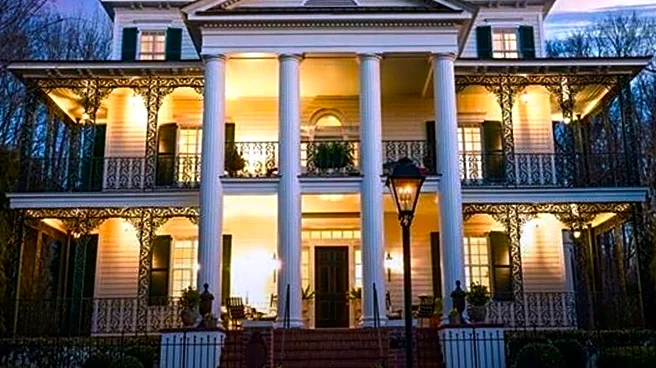What's Happening?
Two historic homes in Princeton, New Jersey, once owned by former U.S. presidents, are making waves in the real estate market. The Tudor Revival-style home of Woodrow Wilson, who lived there until his presidency in 1912, is listed for $6.5 million. This property, built in 1896, features seven bedrooms, 5½ bathrooms, stained-glass pocket doors, a greenhouse, and a koi pond. Wilson's wife, Ellen Axson Wilson, contributed to its design. Meanwhile, Grover Cleveland's former residence, a Georgian mansion built in 1854, sold for $5.28 million after being listed for over a year. Known as 'Westland,' this home served as Cleveland's retirement residence and is now a National Historic Landmark. These properties highlight the premium attached to presidential homes, both in buyer interest and sale prices.
Why It's Important?
The sale and listing of these presidential homes underscore the significant value placed on properties with historical and cultural significance. Such homes not only attract interest from history enthusiasts but also command higher prices due to their unique heritage. This trend reflects the broader real estate market's appreciation for properties with storied pasts, potentially influencing pricing strategies for similar historic homes. The high valuation of these homes may impact local real estate dynamics, setting a precedent for future sales of historic properties in the area. Additionally, these transactions highlight the intersection of real estate and historical preservation, emphasizing the importance of maintaining and valuing properties with historical significance.
What's Next?
The gardens of Woodrow Wilson's former home will be featured in the upcoming Princeton Garden Tour on September 13, offering the public a glimpse into the property's historical charm. This event may further increase interest in the home, potentially attracting more prospective buyers or investors. As the real estate market continues to evolve, the sale of such historic homes may inspire other owners of similar properties to capitalize on their unique heritage. Real estate agents and historians may collaborate to promote the cultural and historical value of these homes, potentially influencing future market trends and preservation efforts.
Beyond the Headlines
The sale of these presidential homes raises questions about the balance between historical preservation and modern real estate development. As these properties undergo renovations and expansions, stakeholders must consider how to maintain their historical integrity while accommodating contemporary living standards. This situation highlights the ethical considerations involved in preserving historical landmarks, as well as the cultural significance of maintaining the legacy of former presidents. The ongoing interest in these homes reflects society's broader appreciation for historical narratives and the role they play in shaping community identity and heritage.











